There’s just something about autumn in South Korea that feels absolutely enchanting. The air turns crisp without being too chilly, making it the perfect season for scenic hikes, cosy cafe stops, and exploring vibrant city streets. Seasonal favourites like roasted chestnuts, sweet potatoes, and warm cups of sujeonggwa (cinnamon punch) add to the cosy charm of the season. But of course, the star of the show has to be the breathtaking foliage: fiery maples, golden ginkgoes, and amber-toned oaks blanketing the mountains and parks across the country.
South Korea autumn leaves forecast for 2025
Overall, the best time to see fall foliage in South Korea in 2025 will be from mid-October to early November. The season begins in the colder northern regions and higher altitudes, before gradually sweeping down to the southern provinces and Jeju Island. Expect the earliest sightings in the mountains of Gangwon-do, while the southern peaks and coastal areas will hold onto their colours well into November. Some destinations see autumn arrive sooner than others, and it often depends on the elevation.
Read on for the location-specific forecast for South Korea’s autumn foliage in 2025.
Also read: Autumn in Korea: Reasons Why Fall is the Best Season to Visit Jeju, Busan, and More
1. Seoraksan Mountain (Gangwon Province, near Sokcho)
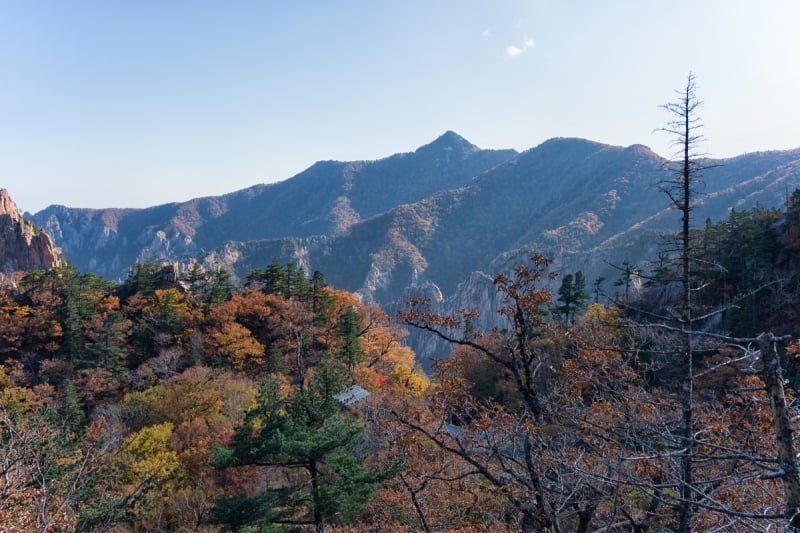
Image credit: july7th via Canva Pro
Seoraksan is one of Korea’s most iconic autumn destinations. The rugged granite peaks and deep valleys glow in shades of red and gold during October, making it a favourite for hikers and photographers. Take the cable car up to Gwongeumseong Fortress for panoramic views, or hike the Biseondae and Ulsanbawi Rock trails to get up close with the colourful forests.
First foliage: 30 Sep 2025
Peak foliage: 23 Oct 2025
2. Odaesan Mountain (Gangwon Province, near PyeongChang)
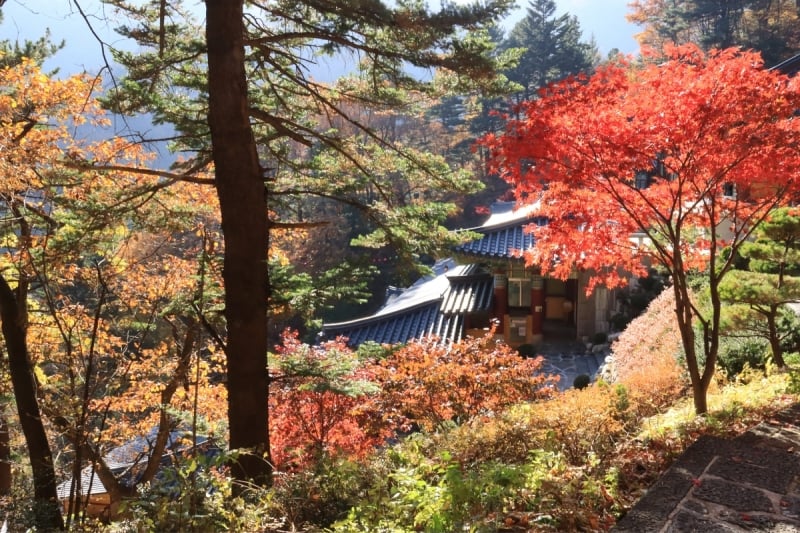
Image credit: Lee Misoon via Canva Pro
Known for its dense fir forests, Odaesan turns into a fiery sea of red maples in mid-October. The best way to enjoy the scenery is to walk the scenic Woljeongsa Temple trail, where golden ginkgo trees line the path leading to the temple. It’s one of the most serene autumn foliage experiences in South Korea.
First foliage: 6 Oct 2025
Peak foliage: 17 Oct 2025
3. Bukhansan Mountain (Seoul & Gyeonggi Province)
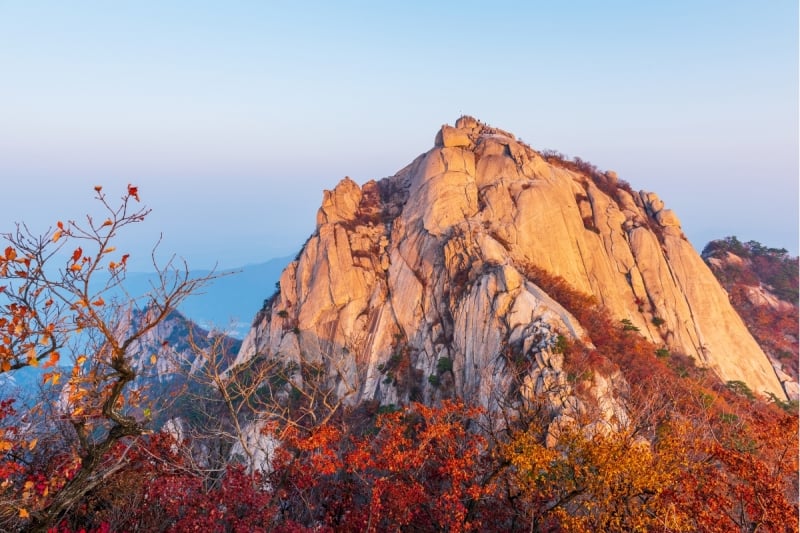
Image credit: CJNattanai via Canva Pro
Located right in Seoul, Bukhansan offers city-dwellers an easy escape into nature. The vibrant leaves contrast beautifully against granite cliffs and old fortress walls. Popular routes include the Baegundae Peak hike, but if you want a gentler experience, opt for the forested valleys near Doseonsa Temple.
First foliage: 17 Oct 2025
Peak foliage: 4 Nov 2025
4. Chiaksan Mountain (Gangwon Province, Wonju)
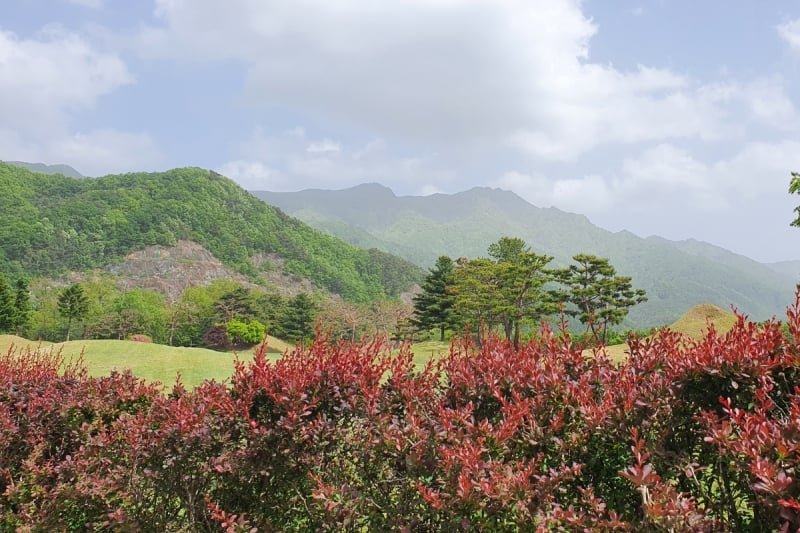
Image credit: Youngmin via Canva Pro
Chiaksan is less crowded than Seoraksan but equally stunning. The Guryongsa Temple area is the best spot to take in the foliage, with hiking trails weaving through fiery maples and tranquil streams. Perfect for those looking for a quieter autumn adventure.
First foliage: 10 Oct 2025
Peak foliage: 25 Oct 2025
5. Woraksan Mountain (North Chungcheong Province)
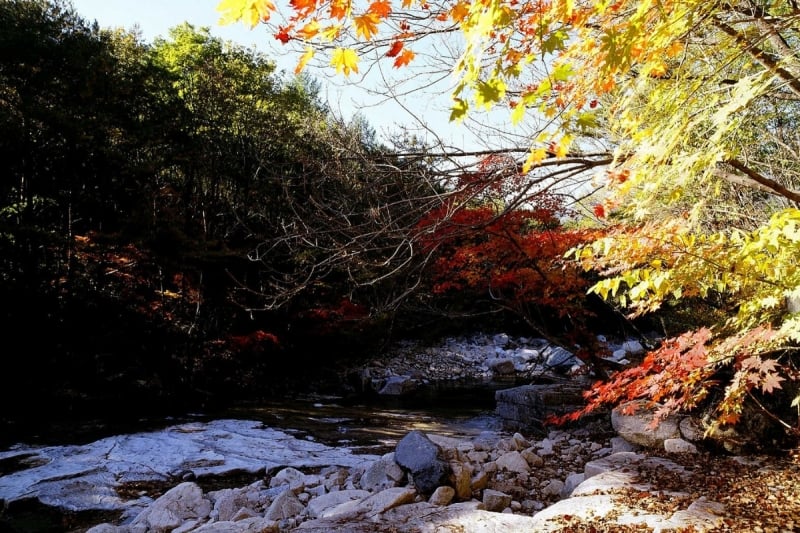
Image credit: Ksw6655 via Wikimedia Commons
Woraksan is famous for its rugged cliffs overlooking Cheongpung Lake. The best way to enjoy the autumn colours here is on a boat cruise, where the golden and crimson reflections on the water create postcard-perfect views.
First foliage: 18 Oct 2025
Peak foliage: 28 Oct 2025
6. Songnisan Mountain (North Chungcheong Province)
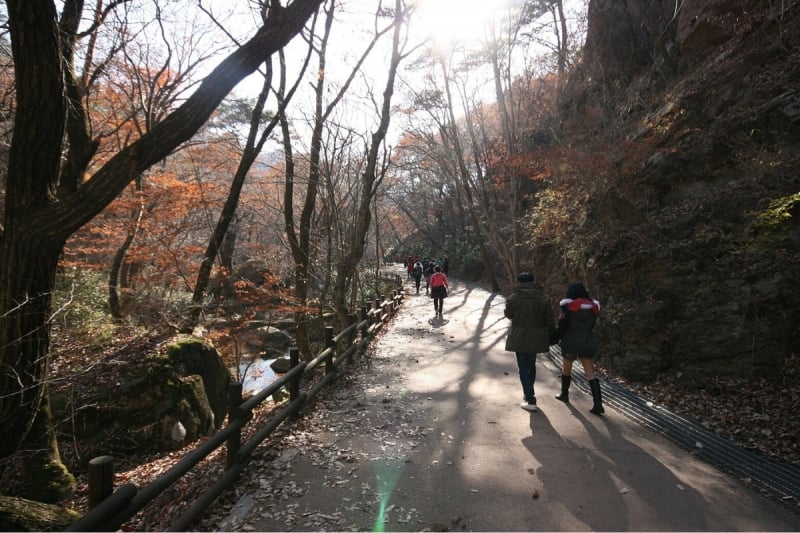
Image credit: Bertconcepts via Wikimedia Commons
Home to the ancient Beopjusa Temple and its giant golden Buddha, Songnisan shines in autumn with its wide valleys drenched in warm colours. The Songnisan Forest Trail is a gentle yet rewarding way to enjoy the foliage, especially in early November.
First foliage: 22 Oct 2025
Peak foliage: 3 Nov 2025
7. Palgongsan Mountain (Daegu / North Gyeongsang Province)
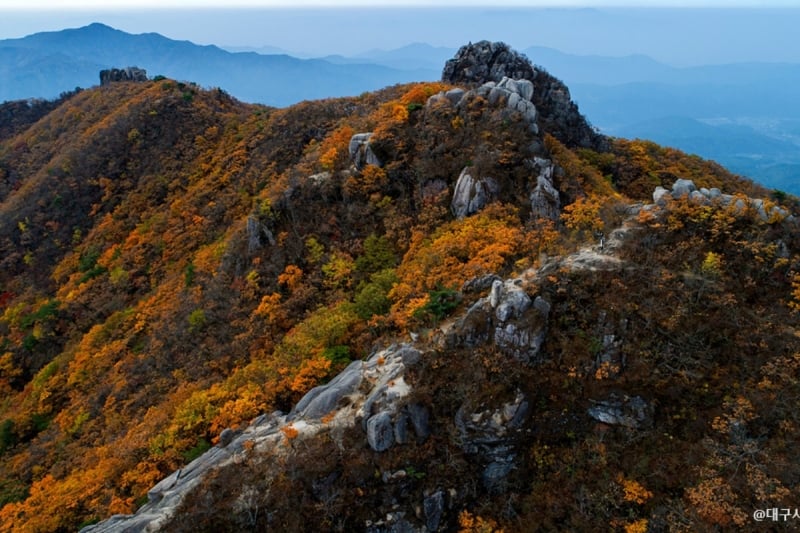
Image credit: visitkorea Official Website
Just outside Daegu, Palgongsan is loved for its scenic drives and temples. The Donghwasa Temple, with its giant stone Buddha, looks especially magical surrounded by autumn leaves. For a leisurely view, follow the circular road around the mountain to take in the foliage without the need for strenuous hiking.
First foliage: 18 Oct 2025
Peak foliage: 3 Nov 2025
8. Gayasan Mountain (North & South Gyeongsang Province)
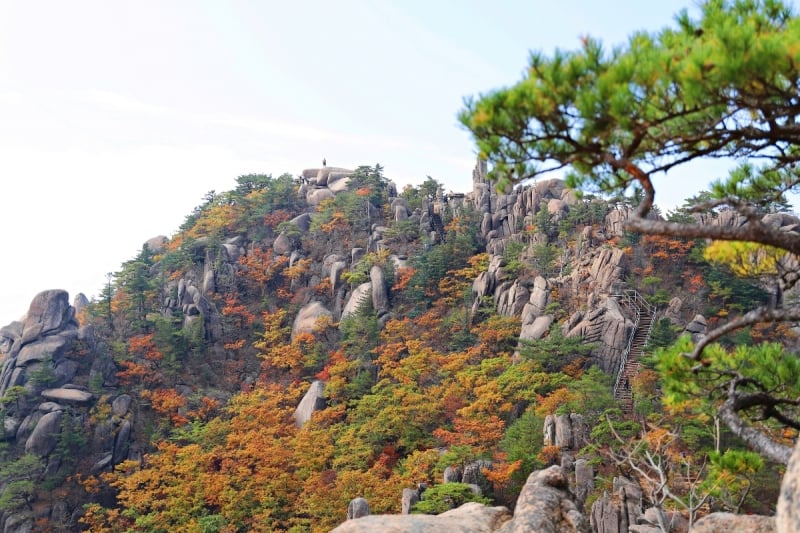
Image credit: VDCM image via Canva Pro
Gayasan is home to Haeinsa Temple, a UNESCO site that houses the Tripitaka Koreana. The temple grounds, surrounded by brilliant autumn forests, are best explored on foot. A hike up to Sangwangbong Peak offers sweeping views of rolling hills blanketed in reds and yellows.
First foliage: 17 Oct 2025
Peak foliage: 1 Nov 2025
9. Gyeryongsan Mountain (South Chungcheong Province, near Daejeon)
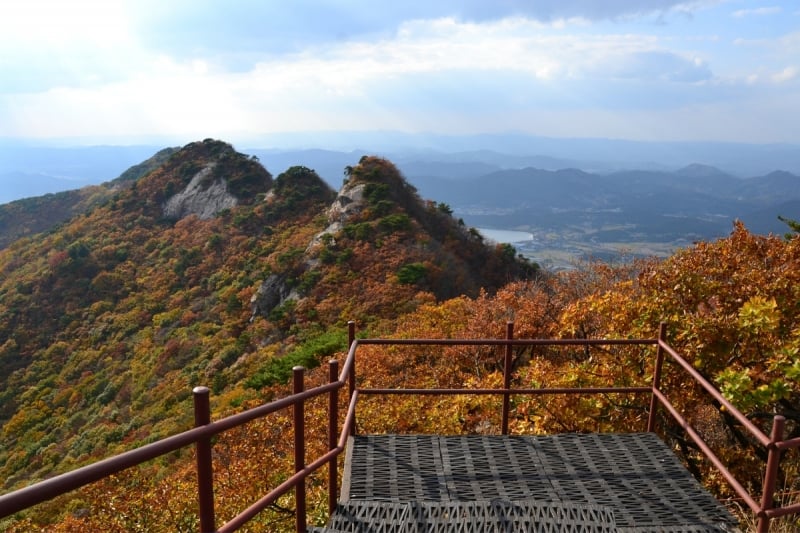
Image credit: Wirestock via Canva Pro
With its jagged peaks and historic temples, Gyeryongsan is a classic autumn hiking spot. The best route is the path to Gapsa Temple, where colourful leaves frame the temple buildings and mountain ridges.
First foliage: 16 Oct 2025
Peak foliage: 1 Nov 2025
10. Naejangsan Mountain (border of North Jeolla Province and South Jeolla Province)
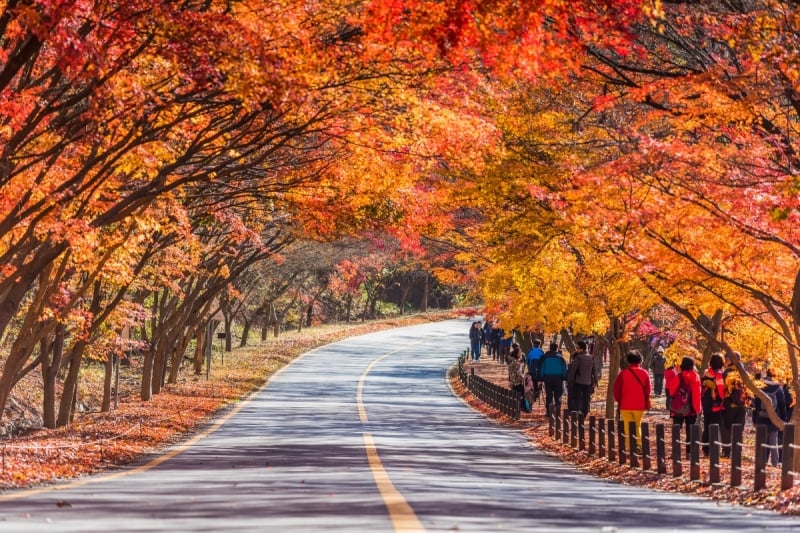
Image credit: CJNattanai via Canva Pro
Often called the best autumn foliage destination in Korea, Naejangsan is famous for its tunnels of red maple trees. The Naejangsa Temple area and Uhwajeong Pavilion are must-sees, and the scenic cable car ride offers a bird’s-eye view of the autumn landscape.
First foliage: 23 Oct 2025
Peak foliage: 11 Nov 2025
11. Mudeungsan Mountain (Gwangju / South Jeolla Province)
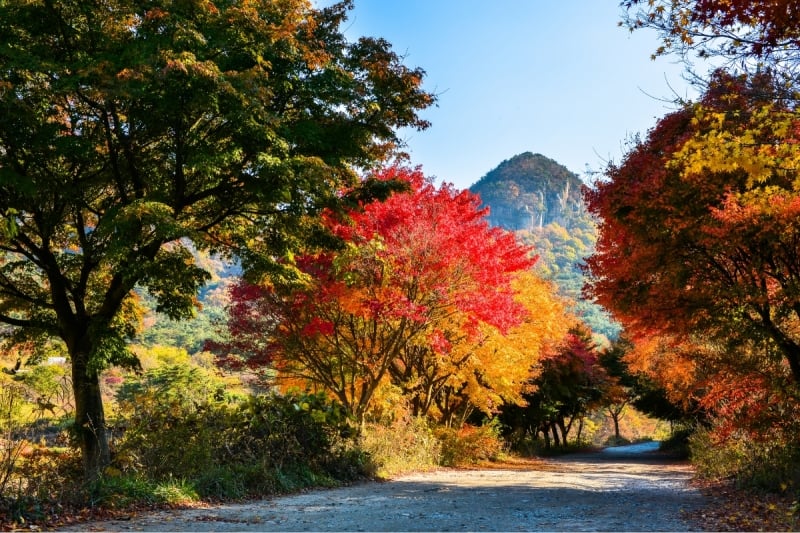
Image credit: sueuy song via Canva Pro
Mudeungsan’s signature columnar joints provide a dramatic backdrop for the warm hues of autumn. The climb to Seoseokdae and Ipseokdae rock formations rewards hikers with sweeping views of colourful valleys stretching into the city of Gwangju.
First foliage: 21 Oct 2025
Peak foliage: 4 Nov 2025
12. Jirisan Mountain (South Gyeongsang / South Jeolla / North Jeolla Provinces)
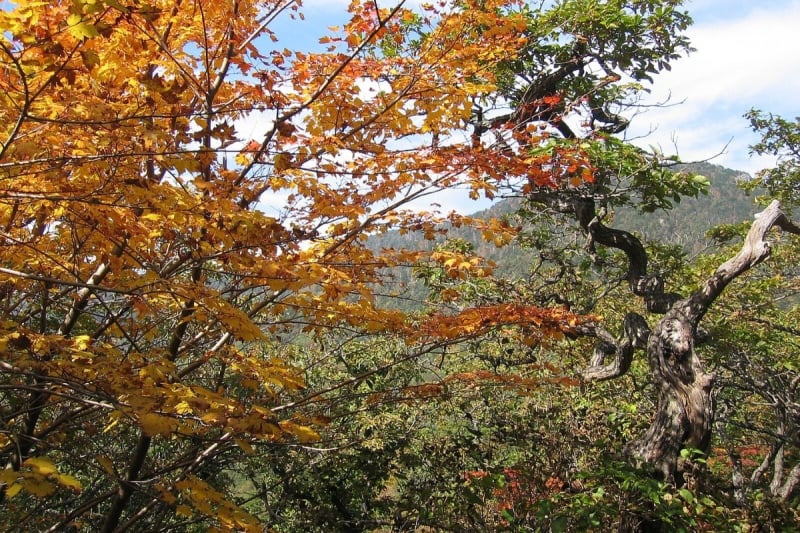
Image credit: eimoberg via Canva Pro
As Korea’s largest mountain range, Jirisan offers diverse trails and breathtaking views. The Piagol Valley is especially famous for its vivid autumn scenery. If you visit in late October, you’ll find the valley glowing with fiery reds and golden yellows.
First foliage: 13 Oct 2025
Peak foliage: 23 Oct 2025
13. Duryunsan Mountain (South Jeolla Province)
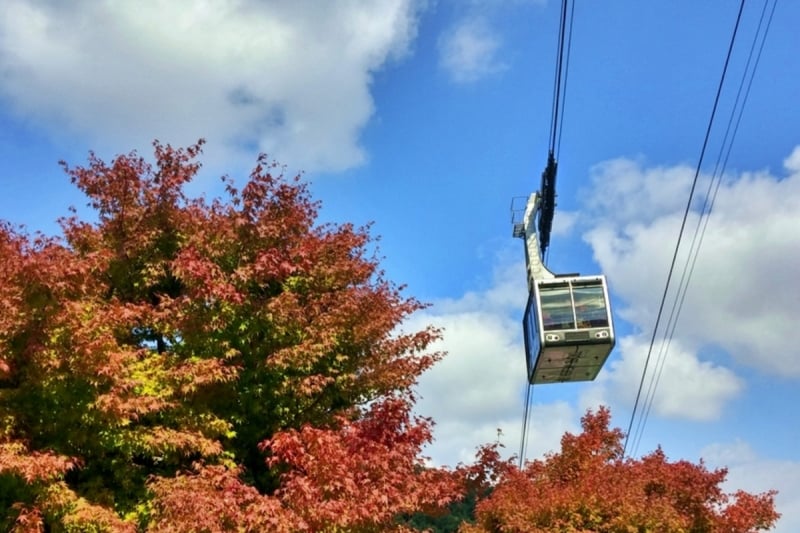
Image credit: hibus.co.kr Official Website
A hidden gem, Duryunsan is best known for its Buddhist temples tucked among colourful forests. The Ttangkkeut Observatory trail offers a panoramic view of the autumn-hued coastline and islands in the distance.
First foliage: 29 Oct 2025
Peak foliage: 10 Nov 2025
14. Hallasan Mountain (Jeju Island)
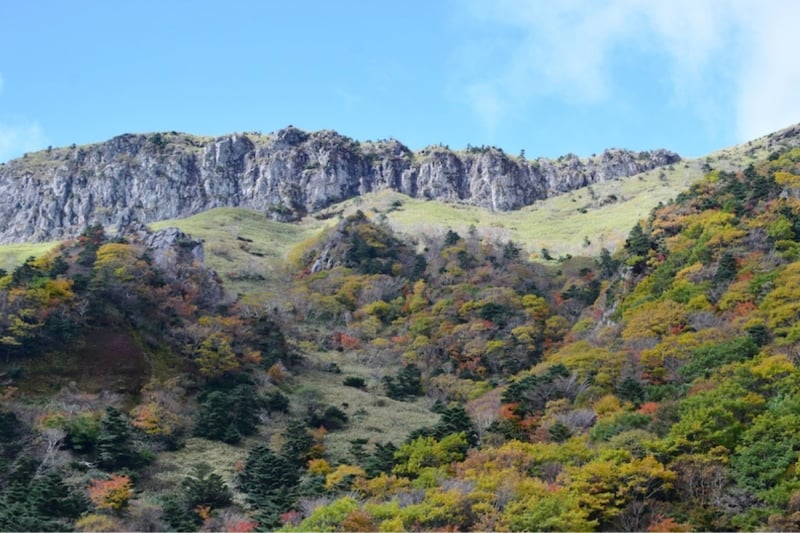
Image credit: visithalla.jeju.go.kr Official Website
Hallasan, South Korea’s tallest mountain at 1,947 m and a UNESCO Biosphere Reserve, transforms into a tapestry of gold and crimson in autumn. Gentle trails like Eorimok and Yeongsil offer sweeping views of the colourful volcanic slopes, while more adventurous routes lead to the summit, where the fiery autumn landscape stretches as far as the eye can see.
First foliage: 14 Oct 2025
Peak foliage: 30 Oct 2025
Also read: 8 Insider Seoul Travel Tips Singaporeans Must Know in 2025
Now, which one’s your top pick to see South Korea’s all foliage in 2025? Don’t forget to check our South Korea travel guides here to help you plan your trip!




